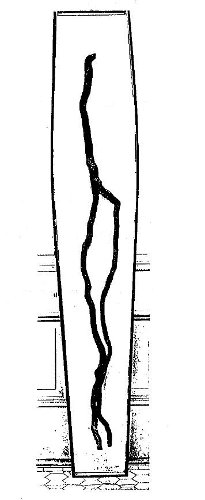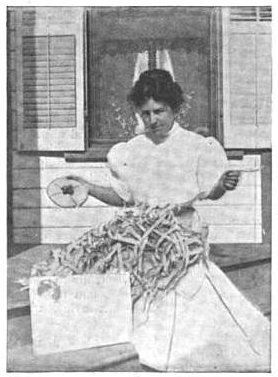“There is no such thing on earth as an uninteresting subject; the only thing that can exist is an uninterested person.”
— G.K. Chesterton
“There is no such thing on earth as an uninteresting subject; the only thing that can exist is an uninterested person.”
— G.K. Chesterton

It has been recorded by reliable authority that near the graves of Roger Williams, the founder of Rhode Island, and his wife, there stood a venerable apple-tree which had sent two of its roots into the graves of Mr. and Mrs. Williams. The larger root had pushed its way through the earth till it reached the precise spot occupied by the skull of Roger Williams. There, making a turn, as if going round the skull, it followed the direction of the backbone to the hips. Here it divided into two branches, sending one of them along each leg to the heel, where both turned upward to the toes. One of these roots formed a slight crook at the knee, which made the whole bear close resemblance to a human form. There were the graves, emptied of every particle of human dust. Not a trace of any thing was left. There stood the guilty ‘apple-tree,’ as it was said at the time, caught in the very act of ‘robbing the grave.’ The fact proved conclusively that bones, even of human beings, are an excellent fertilizer for fruit-trees; and the fact must be admitted that the organic matter of Roger Williams had been transmitted into the apple-tree; it had passed into the woody fibre, and was capable of propelling a steam-engine; it had bloomed in the apple-blossoms, and had become pleasant to the eye; and more, it had gone into the fruit from year to year, so that the question might be asked, Who ate Roger Williams?
— Sereno Edwards Todd, The Apple Culturist, 1871
A touring lecturer started off his favorite lecture: ‘A million years ago this earth was trod by dinosaurs.’ He was immediately interrupted by a well-meaning old lady in the audience, who said, ‘You mean a million and eight years ago, don’t you?’ ‘Why do you say that?’ queried the lecturer. ‘Because I heard you give this same lecture eight years ago,’ explained the old lady.
— Howard Eves, Mathematical Circles Revisited, 1971
If A = 1, B = 2, etc., then:
Discovered by Edward Wolpow and Dmitri Borgmann. See Truthful Numbers.

On Aug. 21, 1974, the London Times announced the reassignment of a Church of England cleric:
Diocese of Salisbury. The Rev J.E.B. Cattell, Vicar of Piddletrenthide with Alton Pancras and Plush, to be priest-in-charge of Buckhorn Weston and Kington Magna.
This drew a flood of responses. Excerpts:
Is there really a parish of Piddletrenthide with Lanton Pancras and Plush? If so, I will have to retire there; it certainly is an improvement on ‘Maidstone.’
It’s in West Dorset and is as delightful as its name implies. We also have Toller Pocorum, Sydling St Nicholas, Whitchurch Canonicorum, and Ryme Intrinseca, to name but four others.
For sheer pleasure to the ear the redeployment of ecclesiastical strength in Yorkshire which appeared in your columns some 14 years ago remains supreme: ‘the Rev G.D. Beaglehole, Vicar of Kexby with Wilberfoss to be Vicar of Bossall with Buttercrambe.’
In 1960 you also announced: ‘The Rev G. Christie, Rector of Roos with Tunstall-in-Holderness, Vicar of Garton with Grimston and Hilston and Rural Dean of South Holderness to be Vicar of Pocklington with Yapham-cum-Meltonby and Owsthorpe with Kilnwick Percy, and Millington with Great Givendale, and Rural Dean of Pocklington.’
We in Hampshire can surely beat them all with our three hearty Wallops — Over, Middle and Nether.
One signpost in Shropshire reads simply: Homer 1, Wigwig 2. How’s that for brevity and wit?
May I on behalf of Scotland offer a brief contribution to this correspondence and draw attention to the tiny but ancient fishing village on the south shore of the Firth of Forth, which proudly bears the name ‘Society’?
The first place listed in Part Two of the 1961 Census Index of Place Names aptly describes the efforts of your readers in this silly correspondence: Labour-in-Vain.
A final letter read, “Sir, as a foreigner, may I say how enjoyable has been your correspondence on this subject, for in my country we do not have such quaint place-names.” It was signed “K.J. Wyatt, Turramurra, Kur-ring-gai, New South Wales.”
A puzzler from Willis Ernest Johnson, Mathematical Geography, 1907:
“A man was forty rods due east of a bear, his gun would carry only thirty rods, yet with no change of position he shot and killed the bear. Where on earth were they?”
ultracrepidarian
adj. one who gives opinions and advice on topics beyond his knowledge

In 1906, while serving in the Navy, Albert Moodie of Austin, Texas, wrote a letter to a shipmate. That wouldn’t normally be noteworthy — but Moodie wrote this letter on the regulation tape that battleships use for receiving wireless messages.
“It took me some two weeks to complete the task,” he reported, “as there is a continuous letter from the beginning to the end of the tape — a distance of over a mile.”
Moodie called it “the longest letter in the world.” His friend received it — and answered it.
Justice Arthur Gilbert of the California Court of Appeal felt that legal motions might be more interesting if they were written in the styles of famous authors. He proposed these motions for continuance:
Ernest Hemingway:
It was busy and there was commotion. I looked out the window where the wind touched the top of the trees and far below, the street, white from the sunlight, and the cars inching forward, but I could feel up here that it would not be good, but there was nothing one could do. Pilar, my secretary, looked at me and her eyes told me that this was as bad as when the bulls are running toward you and there is nowhere to climb and you know you will be trampled, but you know that until they do you can live a good life, a short, happy life. And when I asked her for the file and she said, “What file, Ingles?” I knew that the bulls were loose and there was nowhere to go; there was no yesterday, no tomorrow, but that was then and now is here, Your Honor. There was a time when it was good, but now it is a time when it is bad and you can make it good again, and if you can’t, it’s a rotten shame.
T.S. Eliot:
Thirty days to answer.
It’s the cruelest month.
Dead, dying decay, an apt description
For my brain, withered, not resplendent now,
A supplicant, having been etherized upon a table
During the time to answer.
I ask for relief,
Not with a bang, but a whimper.
James Joyce:
HelpmeohGod Time is creptupandI saidyesohheyesyesyesyesI need relief nowfromignominious default default fault-d de fault is mine ohhelptheteatiscaughtintheproceduralwringer. Relief.
William Faulkner:
Benji had taken the file and went along the fence with it and lost it through the spaces in the fence where the flowers were curling. That’s what they said. I started to cry. Caddy, who smelled like trees, and Quentin, who just smelled, came to find the file, but I didn’t holler ’til mother shouted at Dilsey for bringing me cheap store cake. Dilsey took me up to bed. Quentin told Caddy he had to answer. He had to find the file. Caddy did not know that Benji had taken the file, and Benji could not know that he had taken the file, because this motion is written from Benji’s point of view, and his IQ is 17.
Contrived names of American hair-cutting establishments, from a 1979 survey by Ross Eckler:
“Cutting Corners (Boston, Providence) sounds like a place to avoid.”